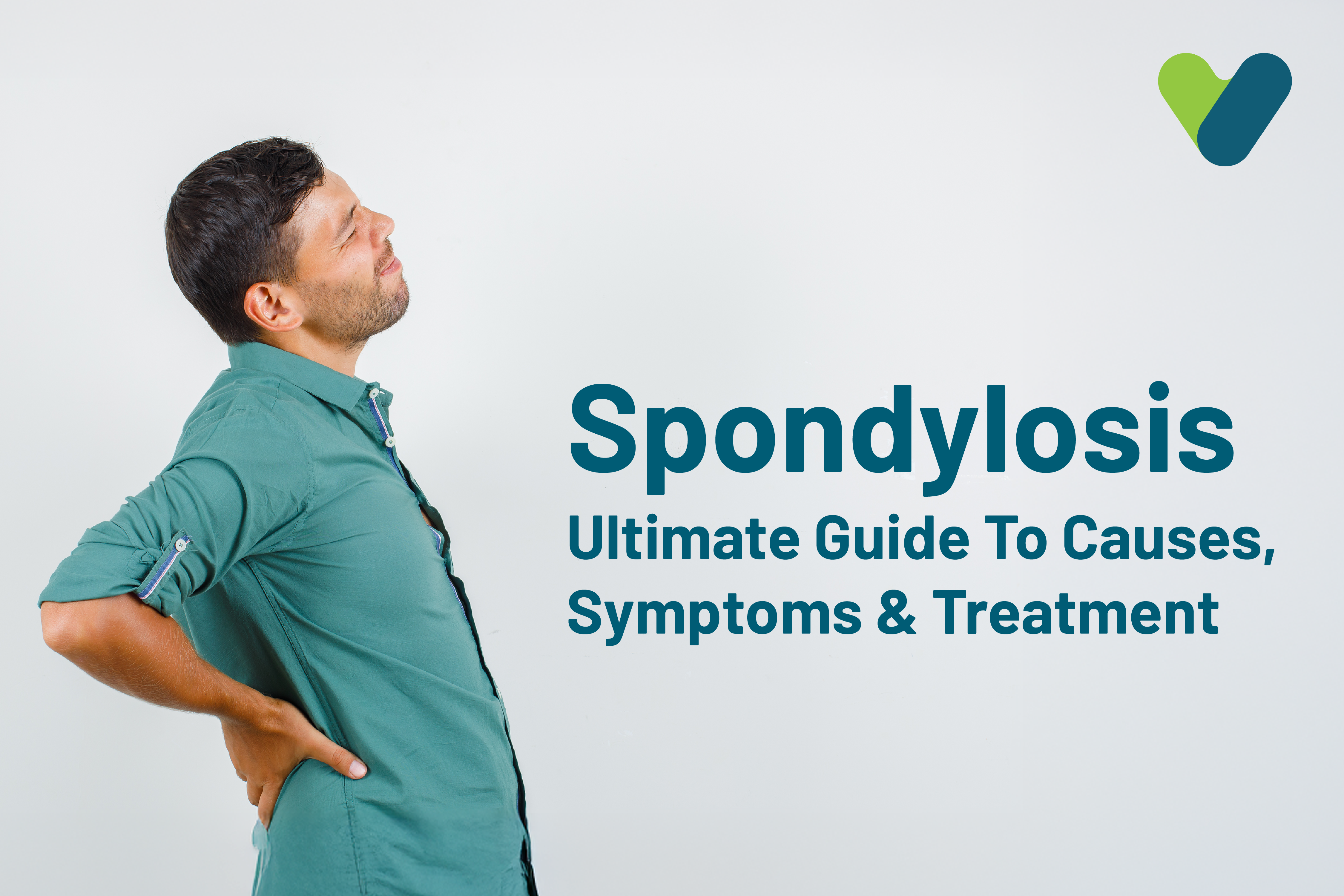Spondylosis is a general medical term for the wear and tear of the spinal disc and joints. This is a common cause that affect the back. This condition is said to worsen with age. This condition is also called degenerative arthritis (or osteoarthritis) of the spine. This is a widespread kind of problem that occurs in older people. It can be treated, but no specific treatment is required in many cases. The article below explains everything about spondylosis, including its causes, symptoms, types, stages, treatment, and diagnosis.
Spondylosis: Case Study
A 19-year-old female who was a student of physical education in Korea. She complained about severe back pain that developed simultaneously. As it was not related to any kind of disability she was treated immediately. Later she was prescribed some oral medicines. After some tests, it came out that she was suffering from spondylosis. This is the case of some of the youngest people to get diagnosed with spondylosis. She was recommended surgery to cure spondylosis. After the surgery, it took 1 year for her to recover.What is Spondylosis?
Spondylosis is when abnormal wear on the cartilage and bones of the neck and spine occurs. It is also said to be the common cause of chronic back pain. This kind of problem is commonly caused by chronic wear on the spine. The disc or cushions between the vertebrae, as they dry out. The ligaments are shrunk and stiffened. Eighty per cent of people older than 60 years are suffering from this disease. It is said that this issue grows over time. But nowadays, many young people are also suffering from this problem. People who are more active at work or in sports may be more likely to have it.Spondylosis Causes[H91]
Spondylosis can be caused by many reasons, including: Aging This is the most common cause of spondylosis among all the reasons. It is because of the wear and tear of the spine and spinal disc as people age. Genetics Sometimes, if someone related to blood is suffering or suffered from spondylosis, then it is most likely to happen to other people in the family. Accidents If you have previous experience in accidents like car accidents or injuries in sports, This can increase the risk of spondylosis. Occupation If your work or occupation includes neck motion, a lot of bending, heavy weight lifting, and twisting. Smoking Sometimes, a lot of smoking leads to stress on the spinal cord. Other Factors The other factors may include being overweight, not exercising, and having problems with the spine and neck.Spondylosis Symptoms
Most of the time, people do not experience any kind of symptoms. At this time, if you experience any type of stiffness or pain in the neck. At this time, it is suggested that a doctor be consulted. The symptoms include:- Stiffness on the neck that gets worse over time
- Headaches (especially at the back of the head)
- Numbness or abnormal sensations in the shoulders, arms, or neck
- Pain spreads on the upper arm, shoulders, and sometimes fingers)
- Difficulty in walking or lack of coordination
- Pain on the shoulder blade.
Spondylosis Types
Their various types of spondylosis include:- Thoracic Spondylosis (rare kind of spondylosis that affects upper and middle back region).
- Cervical spondylosis (affects neck region)
- Multilevel spondylosis (affects different parts of spinal cord)
- Lumbar Spondylosis (affects the lower back region)
- Lumbosacral Spondylosis (affects lower back and extends to sacral area)
- Juvenile Ankylosing Spondylosis (a kind of spondylosis that only affect the young kids or adolescents)
Spondylosis Stages
Spondyloisi can affect through 3 stages mild, moderate, and severe. In the mild stage, you will get pain in the neck, shoulder, and shoulder blades. In this stage, severe pain goes through the arm. A numbness around the nerves and weakness in arms and legs can also be seen. In the last stage, spinal cord compression, pain and stiffness in the body, arms, and legs, limited body movement.Spondylosis Diagnosis
If you ever feel any of the mentioned symptoms and early stages. Then there is a chance of you getting diagnosed with spondylosis. The process of diagnosing includes imaging tests, physical exams, lab tests, and nerve function tests.Spondylosis Treatment
Spondylosis is a kind of chronic condition that does not have any cure. Spondylosis treatment depends upon the type of spondylosis you are suffering from. For the long-term result, physical therapy is the best option Non-steroidal anti-inflammatory drugs (NSAIDs) Pain relievers like acetaminophen or ibuprofen will help a lot in terms of pain or stiffness. In most cases surgeries are not required, but if your surgeon suggests then you may go for this option.Spondylosis Vs Spondylitis
They are two causes of arthritis-related pain and stiffness in your body. Both are quite similar but have some differences. They are 2 causes of arthritis related pain and stiffness in your body. Both are quite similar but have some differences.| Spondylosis | Spondylitis | |
| Symptoms |
|
|
| Cause |
|
|
| Treatment |
|
|
| When this problem happens |
|
|
When to see a doctor?
You may consult a doctor whenever you experience any of the symptoms mentioned. Remember, sometimes the body does not show symptoms. In that condition, you may consult a doctor if you feel uneasiness in your neck, shoulder, back, or hands. References:- Spondylosis. Yale Medicine [Internet]. https://www.yalemedicine.org/conditions/spondylosis. Accessed Oct. 01, 2024.
- What is Cervical Spondylosis?. News Medical Life Sciences [Internet]. https://www.news-medical.net/health/What-is-Cervical-Spondylosis.aspx. Accessed Oct. 03, 2024.
- Spondylosis. Penn Medicine [Internet]. https://www.pennmedicine.org/for-patients-and-visitors/patient-information/conditions-treated-a-to-z/spondylosis. Accessed Oct. 03, 2024.
- Spondylosis. Physiopedia[Internet]. https://www.physio-pedia.com/Spondylosis. Accessed Oct. 06, 2024.
- Cervical Spondylosis (Arthritis of the Neck). OrthoInfo, American Academy of Orthopaedic Surgeons [Internet]. https://orthoinfo.aaos.org/en/diseases--conditions/cervical-spondylosis-arthritis-of-the-neck/ .Accessed Oct. 05, 2024
- Spondylosis: What It Actually Means. Spine-Health. https://www.spine-health.com/conditions/lower-back-pain/spondylosis-what-it-actually-means . Accessed Oct. 06, 2024


